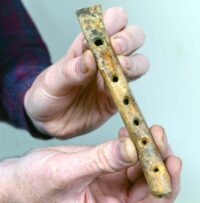 Excavation of a development site at Herne Bay, Kent, on the southeastern coast of England, has unearthed a rare medieval bone flute. The instrument was discovered within the bounds of a rectangular enclosure bounded by a ditch. It was found in a layer with pottery dating to between the 12th and 15th centuries.
Excavation of a development site at Herne Bay, Kent, on the southeastern coast of England, has unearthed a rare medieval bone flute. The instrument was discovered within the bounds of a rectangular enclosure bounded by a ditch. It was found in a layer with pottery dating to between the 12th and 15th centuries.
It’s a fipple or duct flute, an end-blown flute like a recorder or slide whistle. The form is an ancient one — the world’s oldest confirmed flute was carved from the bone of a griffon vulture 40,000 years ago, and the Neanderthal Flute, a partial flute carved from a bear bone is 20,000 years older than that — but there are long gaps on the archaeological record between the prehistoric flutes and the ones that emerged in the early Middle Ages and the latter are still rare finds. Only around 120 archaeological examples have ever been discovered in Britain, ranging in date from the 5th century to the 16th.
The flute was carved from the tibia shaft of a sheep or goat. Five finger holes were bored out of the top, and a thumb hole out of the bottom of the shaft. Archaeologists believe it may have had a mouthpiece of some kind that is now lost, but other than that, the flute it intact and in excellent condition.